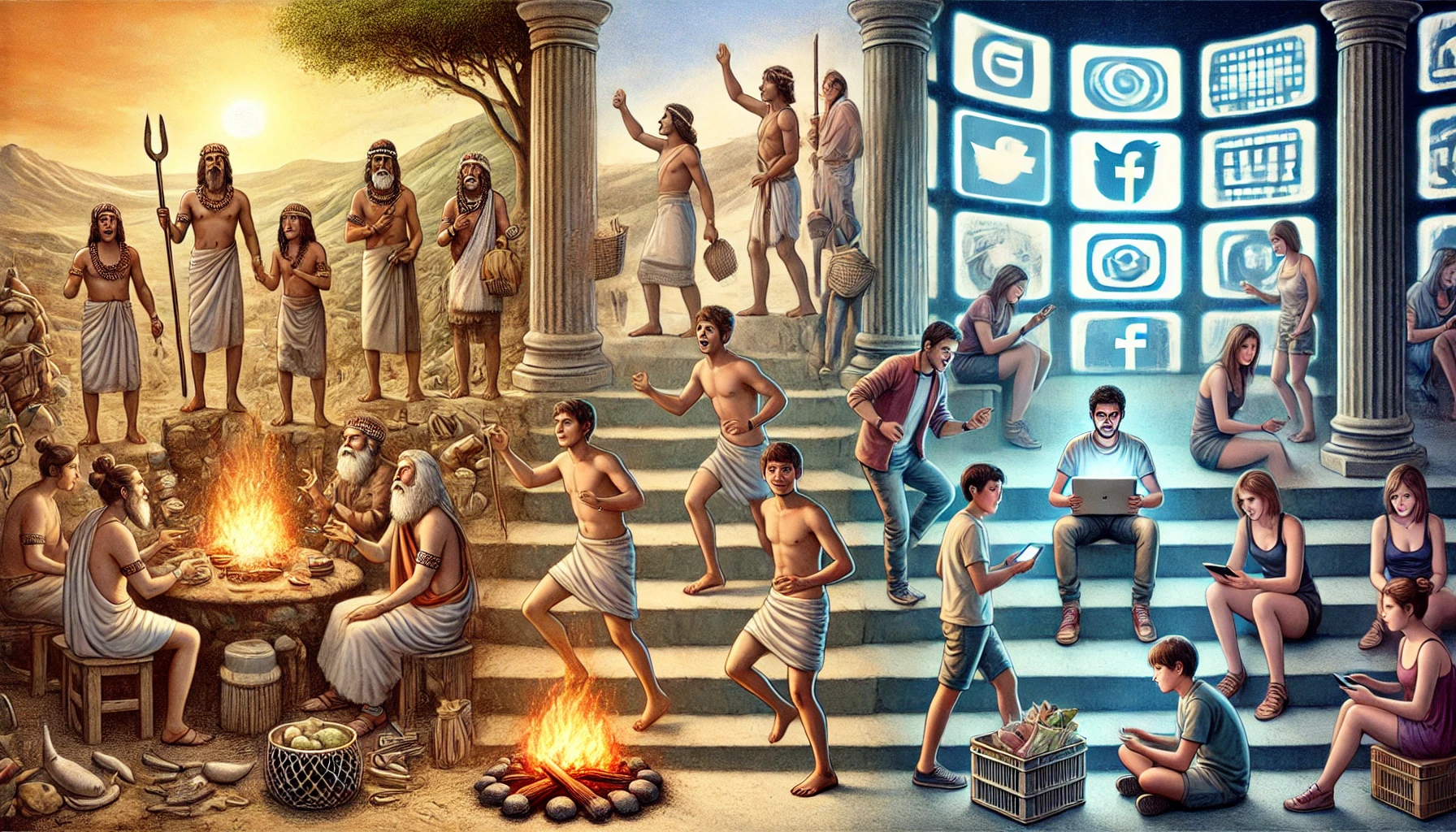Ancient people felt a sense of community solidarity through rituals, but in capitalist societies, play has been transformed into the consumption of goods. The digital revolution has transformed play back into voluntary participation, enabling new community formations. The nature and forms of play evolve with time and social change, reflecting human social, cultural, and psychological needs.
Ancient peoples usually worked individually to survive, but at certain times, such as festivals, they would come together to play and make offerings to the gods. Labor is the process by which humans make nature useful to themselves. It is a sin against the gods because it defaces the original state of nature. To wash away this sin, ritual was a collective play of returning useful objects back to their original state. In ancient societies, sacrifices of the most useful objects were widely practiced. The gods accepted the sacrifice because it was no longer useful. By sharing their offerings with the gods, the ancients felt a sense of solidarity that they all belonged to the same deity. This sense of solidarity was more than just religious; it was important for community cohesion. Through rituals and play, the ancients were able to relieve the drudgery and stress of everyday life and deepen their trust and bonds with one another.
The role of play in ancient societies has undergone many changes in capitalist societies. Capitalist societies seek to maximize productivity by rationally organizing labor. To do this, they increased the intensity of labor and lengthened its duration, but this led to the problem that labor was exhausted and unproductive. Therefore, it was necessary to reduce the duration of labor and increase the duration of breaks. However, even these breaks are mostly spent consuming goods. For example, if you want to travel, you need to buy and consume travel products. This consumption is play for the consumer, but it’s a way to make money for the travel agent. In the end, the consumer’s play brings the most useful object in capitalism into the hands of the seller: capital. This structure transforms the nature of play and makes it part of an economic transaction, not just a means of relaxation and rejuvenation.

As play becomes a form of commodity consumption, the way we enjoy play also changes. Whereas play in the past was primarily a form of direct participation, play in capitalist societies is usually not participatory, but rather a form of spectatorship or consumption. This is because producers have already created play products to be consumed in a certain way. Using the example of traveling again, a travel agency offers a number of travel options, and consumers buy and passively consume them. Traveling as a play has become something to be done, rather than explored and created. Furthermore, in modern capitalist societies, even play is subject to the logic of efficiency and competition. Many people seek to “consume” special experiences in their travel destinations, and value them based on how unique and special they are. As a result, play loses its true spontaneity and creativity, and instead becomes a commercially valued experience.
However, with the digital revolution, more and more people want to spontaneously and directly participate in and enjoy play. This is especially true for younger generations. Young people have a strong desire to be the subject of play. The Internet makes this desire more feasible. The main characteristic of the internet is its interactivity. This is fundamentally different from mass media, such as television, which turns the majority of people into spectators. On almost every internet site, people are both spectators and participants, both receivers and senders, and it is during these interactive activities that a sense of solidarity is created between participants. On social media platforms, for example, users are creating new forms of play by sharing, commenting on, and interacting with each other’s content in real time. This culture of digital play goes beyond mere consumption to form new communities through participation, creation, and interaction, and is becoming a tool for social change.
As such, the nature of play has been transforming into various forms as times and societies change. From ancient ritualistic play to modern consumerism to participatory play in the digital age, the forms and meanings of play are constantly evolving. This shows that play is more than just a leisure activity, but an important component of human social, cultural, and psychological needs. Through play, people break out of their daily routines, have new experiences, form relationships with others, express their identity, and improve their quality of life in many ways. Therefore, understanding the changes in play and its social impact provides an important perspective for understanding contemporary society.
 I’m a blog writer. I want to write articles that touch people’s hearts. I love Coca-Cola, coffee, reading and traveling. I hope you find happiness through my writing.
I’m a blog writer. I want to write articles that touch people’s hearts. I love Coca-Cola, coffee, reading and traveling. I hope you find happiness through my writing.